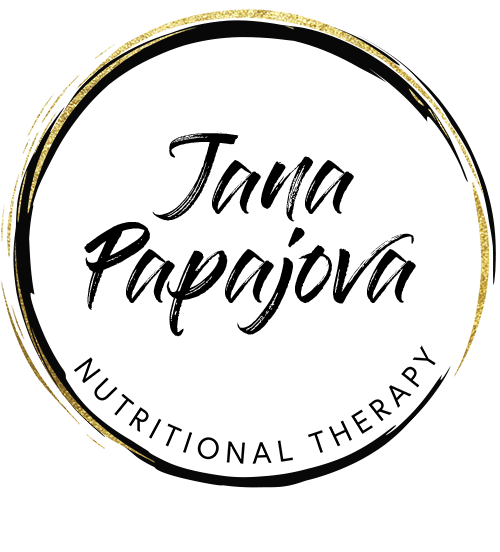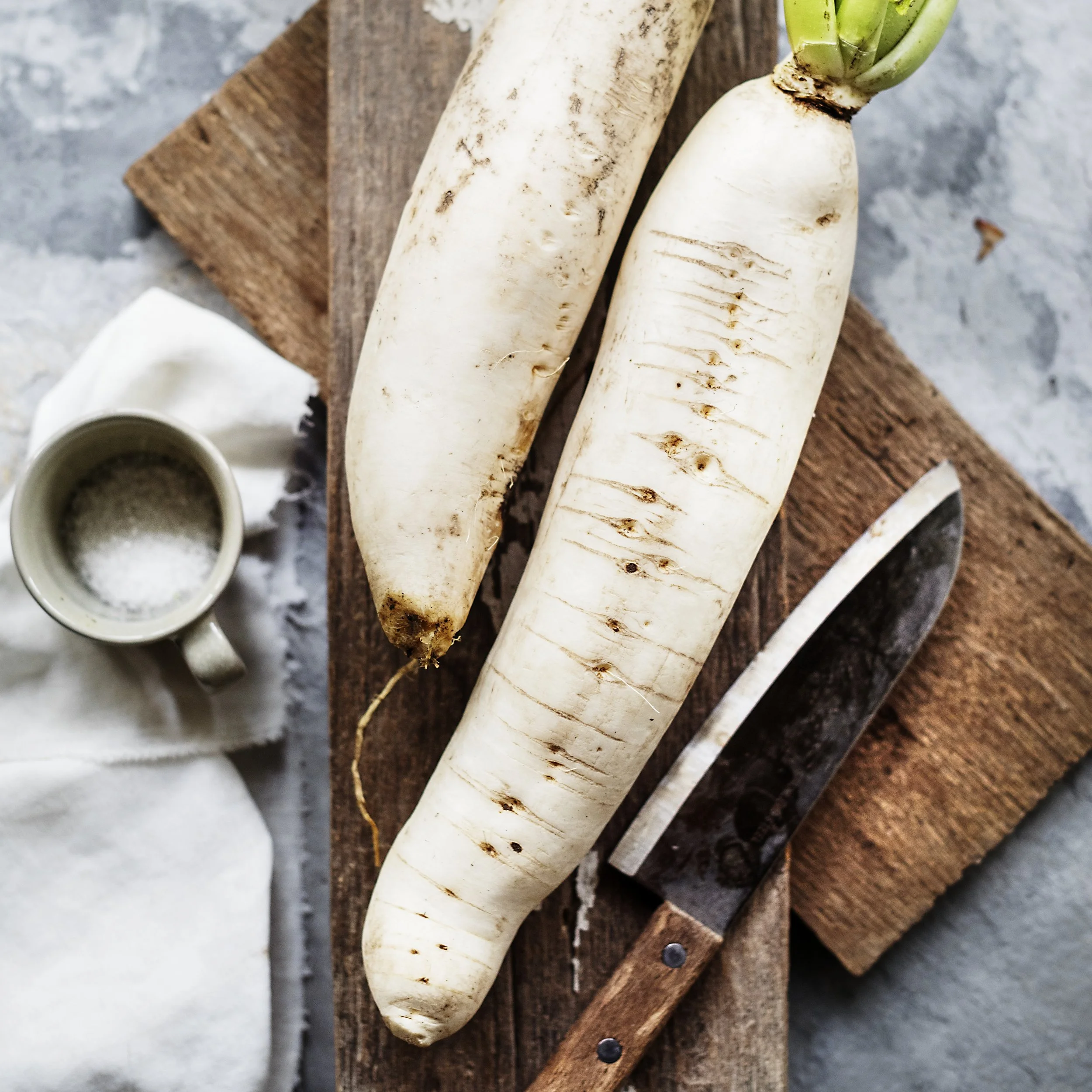TOP 5 HEALTH BENEFITS OF DAIKON
Estimated reading time: 4 minutes
Daikon, also known as mooli, white radish, winter radish, Chinese radish, Japanese radish; is a long, creamy-white cruciferous vegetable with a punchy, peppery flavour. A relative of the radish, they vary in size and resemble a pale carrot. Both the root and the leaves are edible. The root, when cooked, tastes similar to cooked turnips.
NUTRITIONAL FACTS
Nutrients and Percent Daily Value per 100 g (1):
· Calories: 18 kcal (1%)
· Fibre: 1.6 g (6%)
· Carbohydrates: 4.1 g (1%)
· Protein: 0.6 g (1%)
· Fat: 0.1 g (0%)
· Omega 3: 29 mg
· Omega 6: 16 mg
· Vitamin C: 22 mg (37%)
· Folate: 28 mcg (7%)
· Potassium: 227 mg (6%)
· Copper: 0.1 mg (6%)
· Magnesium: 16 mg (4%)
· Calcium: 27 mg (3%)
· Iron: 0.4 mg (2%)
· Phosphorus: 23 mg (2%)
· Selenium: 0.7 mcg (1%)
· Zinc: 0.2 mg (1%)
Glycaemic Index: 1 = Low
HEALTH BENEFITS OF DAIKON
Radishes are among the most nutritionally loaded low-calorie vegetables. They provide high levels of vitamin C and also contain the active enzyme myrosinase (more on that later).
Daikon has antibacterial, anti-inflammatory, antiviral and diuretic properties. It also contains digestive enzymes that help the body process proteins, fats and carbohydrates (2, 4).
Daikon can help with or protect from digestive disorders, constipation, cancer, immune system disorders, osteoporosis, respiratory disorders, acne and water retention (2, 3, 4).
HELPS DIGESTION
Raw daikon contains protease and amylase, types of digestive enzymes which facilitate the digestion of proteins and carbohydrates. The antioxidants in daikon were found to trigger bile flow (4). It also contains enzymes that enable the breakdown of fats, which makes it ideal for people with impaired digestion.
Cut them just prior to eating because in just 30 minutes 50% of its enzymes are lost.
GOOD FOR IMMUNITY
100 grams of daikon contains 22 mg of vitamin C, which is ~30% of the RDA (recommended daily allowance). The vitamin is mainly concentrated in the plant’s leaves, in fact, daikon’s leaves are richer in vitamin C than oranges.
Raw daikon juice can help dissolve mucus and phlegm and assist in the healthy function of the respiratory system (2).
LOWERS CANCER RISK
Radish contains phytochemicals and anthocyanins that have anti-carcinogenic properties. It is rich in sulforaphane, which studies have shown has a proven role against breast, colon, prostate and ovarian cancers (2). Additionally, vitamin C acts as a powerful antioxidant to prevent free radical damage to the DNA inside the cells, thus helping cancer prevention.
Myrosinase is an enzyme responsible for hydrolysis of glucosinolates, compounds found in cruciferous vegetables including daikon. In simple terms it activates the beneficial compounds.
The skin especially is a rich source of myrosinase (5). However, the skin is usually peeled off. Buying organic daikon (try Wholefoods or Riverford) and properly scrubbing the skin instead of peeling, is preferable.
Myrosinase, like many enzymes, will be ‘denatured’ at high temperatures and consequently lose its activity, when cooked. Lightly steaming cruciferous vegetables leaves most of the myrosinase enzyme active.
HELPS TO DETOXIFY
The natural diurectic property of radishes makes them extremely good for improving kidney health. They help eliminate toxins from the body (2) and act as a natural cleanser preventing the collection of waste in the kidneys.
Daikon glucosinolates effectively enhance detoxification enzymes and therefore may possess significant chemo preventive activity (6).
BONE HEALTH
Daikon, like other cruciferous vegetables, is a good source of calcium which helps promote healthy bone growth and thereby lowers the risk of osteoporosis. Daikon leaves especially are an excellent source (2).
SAFETY
Daikon is presumed to be a relatively safe vegetable, however might not be suitable for those suffering from gallstones. Daikon is a goitrogenic food. Goitrogens are substances that could interfere with the normal function of the thyroid gland by inhibiting your body’s ability to use iodine. People with impaired thyroid function are often told to avoid goitrogens for this reason. However, goitrogenic foods are often rich in vitamins and minerals and most experts do not recommend that anyone, including those with thyroid disease, avoid eating them. People with impaired thyroid function that are worried about consuming goitrogens can minimise the risk of negative effects by cooking them and increasing their selenium intake.
Image source: rawpixel.com
Written by: Jana Papajova
Published on: 2nd June 2019
References:
1. Nutrition Data. (2018). Vegetables and vegetable products: Radishes, oriental, raw. [online]. Available at: https://nutritiondata.self.com/facts/ vegetables-and-vegetable-products/2607/2.
2. Hawes, N. (2016). Nature cures. The A-Z of Ailments and Natural Foods. London: Hammersmith Health Books, p.653.
3. Ippoushi, K, Ueda, H. and Takeuchi, A. (2014). ‘Milk prevents the degradation of daikon (Raphanus sativus L.) isothiocyanate and enhances its absorption in rats’. Food Chemistry, 161, pp.176-180.
4. Barillari, J. Cervellati, R. Costa, S. et al. (2006). ‘Antioxidant and choleretic properties of Raphanus sativus L. sprout (Kaiware Daikon) extract’. Journal of Agricultural and Food Chemistry. 54(26), pp.9773-9778.
5. Nakamura, Y. Nakamura, K. Asai, Y. et al. (2008). ‘Comparison of the Glucosinolate−Myrosinase Systems among Daikon (Raphanus sativus, Japanese White Radish) Varieties’. Journal of Agricultural and Food Chemistry, 56(8), pp.2702-2707.
6. Abdull Razis, A. De Nicola, G. Pagnotta, E. et al. (2012). ‘A glucosinolate-rich extract of Japanese Daikon perturbs carcinogen-metabolizing enzyme systems in rat, being a potent inducer of hepatic glutathione S-transferase’. European Journal of Nutrition, 52(3), pp.1279-1285.

